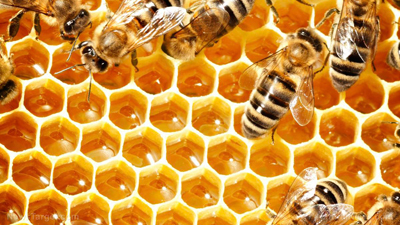HONEY Found to Reduce Arterial Plaque by an Astonishing 30%…
Could it Prevent Heart Attacks?
Vicki Batts
 Could honey be a natural way to prevent heart disease? That may just be the case. New research has found that a natural sugar found in honey, known as trehalose, can help to reduce the presence of arterial plaque by up to 30 percent. This natural sugar is also found in some other foods, such as mushrooms, lobsters and shrimp. So if you don’t like honey, there may be some other options for you. Could honey be a natural way to prevent heart disease? That may just be the case. New research has found that a natural sugar found in honey, known as trehalose, can help to reduce the presence of arterial plaque by up to 30 percent. This natural sugar is also found in some other foods, such as mushrooms, lobsters and shrimp. So if you don’t like honey, there may be some other options for you.
The only caveat is that in order to obtain trehalose’s miraculous benefit, you may have to inject the sugar directly into your veins. But, some would say it’s still a better option than Big Pharma’s concoctions. While honey injections may not be for the faint of heart, the finding was still quite promising.
The researchers from Washington University found that trehalose activates a protein that causes immune cells to start removing plaque deposits from the arterial walls. Plaque can be very damaging to the arteries, and can lead to atherosclerosis. The condition is characterized plaque build-up causing the blood vessels to become stiff and hardened, as well as making the vessels more constricted. This can cause high blood pressure, heart disease, peripheral artery disease and angina. These deposits can also clog your arteries or break off and form clots, putting you at risk of a stroke, heart attack or even gangrene — should the clot get lodged in a blood vessel belonging to one of your extremities.
While atherosclerosis may not initially seem like a real danger, it can actually be life-threatening.
The finding that trehalose can reduce plaque so significantly is especially exciting because of the risks these arterial deposits carry.
The study’s lead author Dr. Babak Razani explained, “In atherosclerosis, macrophages try to fix damage to the artery by cleaning up the area, but they get overwhelmed by the inflammatory nature of the plaques. Their housekeeping process gets gummed up. Trehalose is not just enhancing the housekeeping machinery that’s already there. It’s triggering the cell to make new machinery.”
In the study, the researchers tested on mice that were at risk of developing atherosclerosis. The team divided up the mice into groups: Some were injected with trehalose, while others were fed the sugar orally. Another subset of mice were injected with different types of sugars. The team found that the mice injected with trehalose had plaques up to 0.10 millimeters smaller than those who were given a different treatment. In the trehalose-injected mice, arterial plaques were measured at an average of 0.25 millimeters, while mice not injected with sugar had plaques measuring about 0.35 millimeters.
While those may seem like tiny little measurements with tiny little differences, the results actually indicate a 30 percent decrease in plaque among the animals injected with trehalose — which is rather remarkable. [RELATED: Read more stories about maintaining your health at Prevention.news]
Honey is widely known for a number of health benefits, often due to its antimicrobial properties and its ability to wipe out bacteria. But it looks like there are many other benefits this beloved food may have to offer. Who knows what we’ll learn next! One thing is for sure, honey won’t be losing its place in the natural medicine world anytime soon.

Natural News is a science-based natural health advocacy organization led by activist-turned-scientist Mike Adams, the Health Ranger.
The key mission of Natural News is to empower consumers with factual information about the synthetic chemicals, heavy metals, hormone disruptors and other chemicals found in foods, medicines, personal care products, children's toys and other items.
Natural News covers holistic health, nutritional therapies, consciousness and spirituality, permaculture , organics, animal rights, environmental health, food and superfoods , and performance nutrition.
The site strongly criticizes drugs-and-surgery medicine, vaccines, corporate corruption, animal testing, the use of humans for medical experiments, the chemical contamination of foods, heavy metals in consumer products, factory farming and government corruption.
Natural News also warns its readers about science gone bad and frequently cites examples of science resulting in catastrophies that it calls "crimes" against humanity. Examples of such subjects cited by Natural News include:
Agent Orange
Thalidomide
Nuclear weapons
GMOs and "genetic pollution"
Aspartame and chemical sweeteners
Chemotherapy
The presence of hidden cancer viruses in polio vaccines
The continued use of mercury in vaccines and dental amalgams
The long history of pharmaceutical experiments on human beings, including the Tuskegee syphilis experiments conducted on African Americans in the USA.
Natural News employs a staff of over 20 writers and researchers who write up to 15 original news stories each day.
www.naturalnews.com
|




